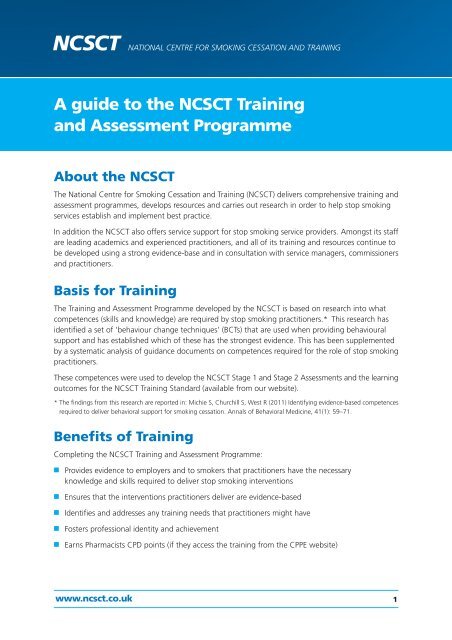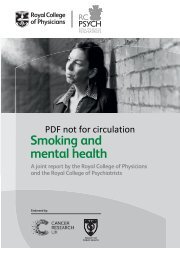here - NCSCT
here - NCSCT
here - NCSCT
- No tags were found...
Create successful ePaper yourself
Turn your PDF publications into a flip-book with our unique Google optimized e-Paper software.
NATIONAL CENTRE FOR SMOKING CESSATION AND TRAININGA guide to the <strong>NCSCT</strong> Trainingand Assessment ProgrammeAbout the <strong>NCSCT</strong>The National Centre for Smoking Cessation and Training (<strong>NCSCT</strong>) delivers comprehensive training andassessment programmes, develops resources and carries out research in order to help stop smokingservices establish and implement best practice.In addition the <strong>NCSCT</strong> also offers service support for stop smoking service providers. Amongst its staffare leading academics and experienced practitioners, and all of its training and resources continue tobe developed using a strong evidence-base and in consultation with service managers, commissionersand practitioners.Basis for TrainingThe Training and Assessment Programme developed by the <strong>NCSCT</strong> is based on research into whatcompetences (skills and knowledge) are required by stop smoking practitioners.* This research hasidentified a set of ‘behaviour change techniques’ (BCTs) that are used when providing behaviouralsupport and has established which of these has the strongest evidence. This has been supplementedby a systematic analysis of guidance documents on competences required for the role of stop smokingpractitioners.These competences were used to develop the <strong>NCSCT</strong> Stage 1 and Stage 2 Assessments and the learningoutcomes for the <strong>NCSCT</strong> Training Standard (available from our website).* The findings from this research are reported in: Michie S, Churchill S, West R (2011) Identifying evidence-based competencesrequired to deliver behavioral support for smoking cessation. Annals of Behavioral Medicine, 41(1): 59–71.Benefits of TrainingCompleting the <strong>NCSCT</strong> Training and Assessment Programme:■■■■■Provides evidence to employers and to smokers that practitioners have the necessaryknowledge and skills required to deliver stop smoking interventionsEnsures that the interventions practitioners deliver are evidence-basedIdentifies and addresses any training needs that practitioners might haveFosters professional identity and achievementEarns Pharmacists CPD points (if they access the training from the CPPE website)www.ncsct.co.uk1
NATIONAL CENTRE FOR SMOKING CESSATION AND TRAININGA guide to the <strong>NCSCT</strong> Training and Assessment ProgrammeTraining ProcessRegister with the <strong>NCSCT</strong>Via www.ncsct.co.uk or via www.cppe.ac.ukfor pharmacists (15 minutes)Review of current knowledgeTraining needs analysis of 25 multiple choicequestions to identify any gaps in existingknowledge (30 minutes)<strong>NCSCT</strong> Training CourseCompetence-based training programmeincluding core knowledge and skills neededby practitioners (6 to 8 hours to completewhole course in one sitting)<strong>NCSCT</strong> Stage 1 (knowledge) Assessment25 multiple choice questions, leading to <strong>NCSCT</strong>Stage 1 Certification if a score of at least70% is achieved (30 minutes)FailPass<strong>NCSCT</strong> Stage 1 CertificationLocal training / clinicalexperience / revisionof ‘Practice’ sectionof training<strong>NCSCT</strong> Face-to-FaceTraining Course inBehavioural SupportTwo-day training course for services andindividuals. Availability and cost on application<strong>NCSCT</strong> Stage 2 (practice) Assessment20 multiple choice questions on clinical practice,leading to Full <strong>NCSCT</strong> Certification if a scoreof at least 70% is achieved.FailPassFull <strong>NCSCT</strong> Certificationwww.ncsct.co.uk2
NATIONAL CENTRE FOR SMOKING CESSATION AND TRAININGA guide to the <strong>NCSCT</strong> Training and Assessment ProgrammeTraining Course■ The online <strong>NCSCT</strong> Training Course covers the following areas:Basic knowledge: (assessed with Stage 1 Assessment)1. Smoking in the population2. Smoking and health3. Why people smoke and find it hard to stop4. How people manage to stop5. What is and is not effective in helping people stop6. Biomarkers for smoking7. W<strong>here</strong> smoking fits into public healthPractice: (assessed with Stage 2 Assessment)1. Behaviour Support Programme: Assessing and Planning2. Behaviour Support Programme: Delivery■■■■■■■■The course is evidence-based, and was written by experts in the field and extensively pilotedwith stop smoking practitionersT<strong>here</strong> is approximately six to eight hours of study materials which can be accessed in asmany sittings as required pre assessment, and also post assessment as reference materialand a guide for practicePractitioners can choose their own path through the course and review materials as neededdepending on prior knowledge and experienceThe emphasis is on information that is necessary for the role of stop smoking practitionersT<strong>here</strong> are video clips explaining and demonstrating important components of behavioural supportT<strong>here</strong> are additional information and links to other resources throughoutT<strong>here</strong> are self-test questions to check understanding on most topicsResearch shows completing the course results in a significant improvement in practitionerknowledge and a reduction in the gap in knowledge between practitioners on the basisof experience and previous training<strong>NCSCT</strong> helpdesk: Email: enquiries@ncsct.co.uk Phone: 020 3137 9071(Enquiries answered 9 am – 5 pm Monday – Friday)www.ncsct.co.uk3
NATIONAL CENTRE FOR SMOKING CESSATION AND TRAININGA guide to the <strong>NCSCT</strong> Training and Assessment ProgrammeAssessmentsStage 1 (knowledge) Assessment■■■■■■■■■When practitioners feel confident with the material in the training course, they can sit theStage 1 (knowledge) Assessment by logging out of the training programme and loggingback in to select ‘Stage 1 Assessment’The online Stage 1 (knowledge) Assessment is made up of 25 multiple choice questions(following a similar pattern to the initial review of knowledge), and assesses core knowledgeacross all seven sections of the training programmeThe test should require 30 to 60 minutes to complete and must be taken in one uninterrupted sittingEach multiple choice question is randomly drawn from a bank of available questions andinvolves selecting one correct answer from four possibilitiesThe pass mark is 70% and upon passing gives practitioners <strong>NCSCT</strong> Stage 1 CertificationIf practitioners do not pass the assessment they can retake it, but on each occasion they willhave to wait a minimum of seven days to allow time to access the online training course andbrush up on knowledge (e.g. failing on a Tuesday means re-sitting on the following Wednesdayat the earliest)T<strong>here</strong> is no limit on the number of times practitioners can take the online Stage 1 AssessmentOnce a practitioner passes they should not re-sit the asessment. If they wish to revise, they cansimply access the training course and use the multiple choice practice questions that are placedthroughout the training programmeA Stage 1 certificate will be posted to practitioners upon successful completion of the assessmentand their name will appear in the <strong>NCSCT</strong> Stage 1 Certified list on our website the day afterthey pass. Managers and commissioners can use this to search by name or PCT to identifytheir practitioners who have passed and are <strong>NCSCT</strong> Stage 1 Certifiedwww.ncsct.co.uk5
NATIONAL CENTRE FOR SMOKING CESSATION AND TRAININGA guide to the <strong>NCSCT</strong> Training and Assessment ProgrammeStage 2 (practice) Assessment■■■The online Stage 2 (practice) Assessment in only available to those who have passed theStage 1 (knowledge) AssessmentThe Stage 2 (practice) Assessment assesses skills and t<strong>here</strong>fore primarily draws on the ‘Practice’section of the training course, any face-to-face training received and practitioners’ own clinicalpracticeTo prepare and / or revise practitioners are advised to go through the ‘Practice’ section andwatch the videos contained t<strong>here</strong>in. A familiarity with the Standard Treatment Programme (STP),which goes through all the key elements of each session with a smoker, is also highly recommended(available from the <strong>NCSCT</strong> website)■When practitioners feel confident with the material in the Practice section of the trainingcourse and the STP, they need to log out of the training course and log back in to select‘Stage 2 Assessment’■■■■■■■■For problems logging in, or if practitioners’ email address has changed, they should contactthe <strong>NCSCT</strong> helpdeskThe assessment involves watching and listening to film clips of advisors with clients and answering20 multiple choice questions on what they did well or inadequatelyWe recommend making notes of what is said in the consultation to help practitioners ascertainif something has been left out that should have been includedPractitioners will need video and sound enabled on their computer and will require a reasonableinternet connection / bandwidth / speed. T<strong>here</strong> is a sample video to watch at the start. If thevideo does not play well, practitioners will need to consult their local IT service or access thetraining from somew<strong>here</strong> with a better internet speedAs with the Stage 1 Assessment, the pass mark for the Stage 2 Assessment is 70% and t<strong>here</strong>is a seven day stand-down between attempts in which time unsuccessful practitioners are advisedto revise the ‘Practice’ section of the training course (including watching the videos), to recapbest evidence-based practicePassing the Stage 2 Assessment gives practitioners Full <strong>NCSCT</strong> CertificationA certificate will be posted to practitioners upon successful completion of the assessment andtheir name will appear in the Fully <strong>NCSCT</strong> Certified list on our website. Managers and commissionerscan access this list, searching by name or PCT to keep track of their practitioners who are Fully<strong>NCSCT</strong> CertifiedAfter the assessments the training course remains accessible at any time as a reference forpractice and we would encourage its use in that waywww.ncsct.co.uk6














